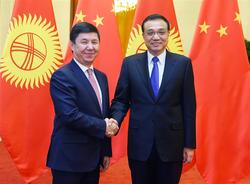
ZHENGZHOU (Xinhua) -- Ten Chinese firms are close to reaching final investment deals with an agricultural cooperation zone in Kyrgyzstan, following the entry of another six Chinese firms last year.
The new investors are agricultural enterprises from Beijing and central provinces of Hubei and Henan. They plan to invest more than one billion yuan (155 million U.S. dollars) in the zone, said Liu Junyong, deputy general manager of Henan Guiyou Industrial Group, operator of the zone.
Guiyou purchased a troubled animal husbandry company in Kyrgyzstan in 2011, which has a 5.67 sq km factory area. Six companies from Henan have invested 22 million U.S. dollars in the cooperation zone, providing more than 400 jobs for local people.
Besides infrastructure and energy, agriculture is one of the hot sectors in central Asia, attracting huge Chinese investment. The investment is boosted by the Belt and Road initiative proposed by China.
"The Belt and Road initiative is a catalyst to prompt Chinese companies to seek cooperation opportunities in central Asia," said Liu.
On Tuesday in Zhengzhou, Chinese Premier Li Keqiang told a meeting of prime ministers from the Shanghai Cooperation Organization (SCO) member states that China is willing to work with other SCO countries to actively expand agricultural cooperation to guarantee food security.
A joint communique of the SCO meeting also stressed the necessity for more active interaction in agriculture via bilateral and multilateral projects in animal husbandry, plant cultivation, production and processing of agricultural goods and land reclamation.
Another Henan-based company, Jingyan Yinhai Seed Co., Ltd, is also a beneficiary of the ongoing cooperation. The company has invested 120 million yuan and set up an agricultural technology park on a large plot of rented land in Tajikistan.
"The land is fertile here, but it lacks advanced crop breeding and planting technology. The strong demand makes our cooperation mutually beneficial," said Li Wei, general manger of Jingyan Yinhai Seed.
The demonstration project employs 300 to 400 local people and trains 3,000 agricultural technical staff for the country, according to Li. Production of corn, wheat and cotton per hectare in the park doubles that of the average of local croplands.
"The cooperation-oriented Belt and Road strategy is to seek common development between China and other countries," said Gao Fei, a professor at China Foreign Affairs University.
According to Liu Yang, an agricultural analyst with Citic Securities, the cooperation between China and countries along the Belt and Road has the potential volume of 750 billion yuan in plant cultivation, animal husbandry and seeds.
"It is a good time for Chinese companies to go abroad," he said.
But Chinese firms should avoid irrational investment and excessive competition between themselves, Li warned.
High financing costs and different regulations abroad are also a problem for companies, said Liu.
At the SCO meeting in Zhengzhou, Premier Li Keqiang proposed considering the establishment of an SCO development bank at a proper time.
"We hope the financing difficulties will be solved in the future with deeper financial cooperation between China and central Asian countries," said Liu.












